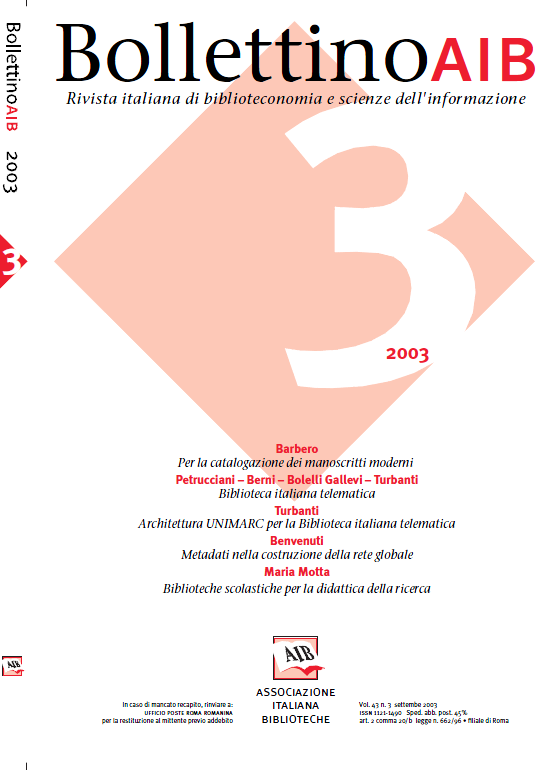School libraries: a resource for research didactics
Main Article Content
Abstract
In a society such as ours where information is produced and consumed at dizzying speeds, it becomes essential to equip oneself with the capacities necessary for weighing and selecting information input in order to transform it into knowledge.
A library acquires a new importance by virtue of its activity of arranging and mediating information. A school library must have its further formational task acknowledged. This is clearly deduced from the UNESCO Manifesto and from the Guidelines of IFLA on school libraries, and from the promotion campaign undertaken by the Italian Ministry for Education as early as 1999. The reflection on the central role that a school library can play in the construction of the curriculum should urge the librarian to cooperate with the teachers of the various disciplines to educate the students in research, through a special didactic programme that is carried out in successive phases and foresees the use of various tools. Research didactics will permit students to creatively acquire new skills and knowledge, in a learning perspective that will last throughout their lives. The most immediate goal is that of making the student overcome the passive role of receiving knowledge only through hierarchical transmission, in favour of an active role that makes him use his independent capacity to build knowledge, allows him to acquire an awareness of his cognitive styles, and stimulates him to master the development of his mental processes.
A library acquires a new importance by virtue of its activity of arranging and mediating information. A school library must have its further formational task acknowledged. This is clearly deduced from the UNESCO Manifesto and from the Guidelines of IFLA on school libraries, and from the promotion campaign undertaken by the Italian Ministry for Education as early as 1999. The reflection on the central role that a school library can play in the construction of the curriculum should urge the librarian to cooperate with the teachers of the various disciplines to educate the students in research, through a special didactic programme that is carried out in successive phases and foresees the use of various tools. Research didactics will permit students to creatively acquire new skills and knowledge, in a learning perspective that will last throughout their lives. The most immediate goal is that of making the student overcome the passive role of receiving knowledge only through hierarchical transmission, in favour of an active role that makes him use his independent capacity to build knowledge, allows him to acquire an awareness of his cognitive styles, and stimulates him to master the development of his mental processes.
Article Details
Section
Articles

This work is licensed under a Creative Commons Attribution-ShareAlike 4.0 International License.
